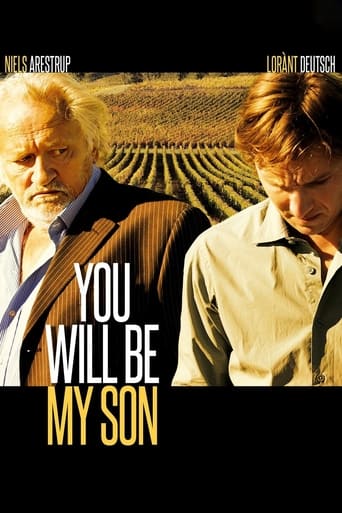writers_reign
Neils Arestrup plays Lear? Not quite, but this exceptional film does rework Shakespeare especially in the sub-plot of Lear involving Gloster's (Shakespeare's spelling) two sons, Edgar and Edmund and the parallel even extends to the Gloster figure, played to perfection by Patrick Chesnais, being terminally ill whereas Gloster was merely blinded. There is so much to admire here not least the comprehensive coverage of running a vineyard - in this aspect we can find comparisons with Moby Dick i.e. part fiction, part documentary - and the acting across the board is of the highest quality. After a long career providing film-enhancing support Arestrup finally gets a chance to strut his stuff in a leading and largely unsympathetic role and is equalled, if not surpassed by Chesnais, another largely unsung French actor who never disappoints and brings lustre to even the most thankless role. In this film Chesnais and Arestrup are the Burt Lancaster/Kirk Douglas of France and a thousand times better. This is a film almost beyond praise and cannot be recommended too highly.
Sindre Kaspersen
French screenwriter, producer and director Gilles Legrand's third feature film which he co-produced and co-wrote with French screenwriter and director Delphine de Vigan, premiered in France, was shot on locations in France and is a French production which was produced by producer Frédéric Brillion. It tells the story about a middle-aged Roman Catholic monarchist named Paul de Marseul who lives on a grand estate in Les Etourneaux in Nice, France where he runs a vineyard. When Paul's long-time collaborator named Francois Amelot learns that he is dying from cancer, Paul's son named Martin who works for him and lives on his estate with his wife named Alice makes himself available to take over Francois' position, but Paul doesn't regard his son that highly and is more concerned with Martin giving him a grandson. Distinctly and precisely directed by French filmmaker Gilles Legrand, this finely paced fictional tale which is narrated from multiple viewpoints though mostly from the two main characters' viewpoints, draws an increasingly dramatic portrayal of a seasoned wine maker who was sent away from home as a nine-year-old in the early 1950s to attend a Jesuit boarding school and who was noticed for the first time and trained by his father as a 17-year-old, and his relationship with his only child whom he thinks has a personality which is more compatible to that of his mother than to his. While notable for its distinct, atmospheric and naturalistic milieu depictions, masterful cinematography by French cinematographer and director Yves Angelo, reverent production design by production designer Aline Bonetto, costume design by costume designer Tess Hammami, film editing by film editor Andréa Sedlackova and use of sound, colors and light, this dialog-driven and narrative-driven story about a father's resentment towards his own flesh and blood whom he likes to dictate and taunt, depicts two conflicting and heartrending studies of character and contains a timely and prominent score by composer Armand Amar.This elegiacally atmospheric, sarcastically humorous and densely generational character piece which is set during a summer in France in the 21st century and where a French man named Philippe whom has been living in Chile for the last three years arrives at the Marseul family estate without any other reasons for his visit than to meet his father, and is embraced by his fathers' friend and associate, is impelled and reinforced by its cogent narrative structure, substantial character development, rhythmic continuity, unsentimental dialog, indifferently claiming and disowning comment by Paul : "I'm your father, aren't I", the majestic acting performance by French actor Niels Arestrup and the involving acting performances by French actors Lorànt Deutsch, Nicolas Bridet, Patrick Chesnais and French actress Anne Marivin. An eloquently psychological, commandingly cinematographic and revering narrative feature.
willev1
The film is a well-crafted study of two fathers and two sons. One father owns a prestigious French vineyard but cannot accept or encourage his own son, whom he actually despises, despite the young man's constant attempts to please his father. The other father, terminally ill with cancer, had been estate manager of the vineyard. When his son, who had emigrated and worked for a California winery, returns to visit his dying father, the vineyard owner is so impressed that he attempts to lure the visitor back to France with an impressive job package... including an offer to legally adopt him so that he would share in the inheritance of the vineyard. So now the lines of conflict are neatly in place. One son versus the other. The dying father versus the vineyard owner whom he believes is trying to "steal" away his son... added to the basic conflict between a demanding father and his thankless son. The characters are skillfully drawn and flawlessly acted by a marvelous cast of French players. I thought the direction and photography were superb; you will also learn a lot about the art of growing grapes and producing fine French wines.
cestmoi
The lead is a distinctive actor with all the subtlety of the script in this role. The poor beleaguered son is so unsure of his place in the world that his masochism in remaining in his father's universe is barely believable...though his behavior begs for more beatings of a psychological kind. The loyal wife of the junior loves him for reasons unknown to the viewer; under the sheets, perhaps? The once (1960-70) disco scene is resurrected here to hardly any purpose. The manager of the vineyard, dying of cancer, gets the best draw of script which he fulfills with professionalism and dignity, and his practical and loyal wife plays her role beautifully. As to the prodigal would be son, an insensitive cad and gainer well played here. The logic of the script is minimal and the resolution more abrupt and fevered than what precedes it logically allows. Beautiful shots of the vineyard. All in all, this vintage is pas mal but no chapeau.


